National Council is the nation’s home. Dignity and national authority must be manifested in the home of nation. In Afghanistan, however, the status of parliament has declined. Members of Wolesi Jirga (Lower House of the Parliament), who enjoy great immunity, spend national budget in an acceptable way. So, every citizen has the right to impeach their representative. The parliament should be impeached in open so as to make it clear to the entire citizen of Afghanistan since it has authority and the right to vote of confidence and no confidence. It also has the authority of supervising the executive and judiciary powers. This right is concomitant with responsibility. But parliament enjoys the privileges without performing its basic responsibility.
Wolesi Jirga has a very strong legal and financial backing. Afghan Constitution defines National Council as the supreme organ of law and the manifestation of national will. This interpretation has been reclaimed in the greatest national document. The constitution bestowed great competence to National Council. It is the parliamentary authority that changed Afghanistan’s political system from presidency to semi-presidency. Despite all this authority, National Council is extremely point – which is neither a secret nor able to be restored through political justification. Parliament could not fulfill public expectations. People’s expectations can never be unreasonable since the expectation from an institution will be formed on the basis of its status. The position of National Council creates a legitimate role for parliament and legitimate expectations for citizens.
So far, National Council was not able to retain its authority or fulfill its role in Afghanistan. Lack of these two principles filled Afghans with a sense of disappointment. The challenges with National Council does not relate to the legal structure of parliament but to MPs. The weak management of the board of directors and lack of MPs’ sense of responsibilities are two basic problems that have continued over years. Parliamentary leadership has spent much time in its internal conflicts. Intra-organizational conflicts will eventually cripple any organization.
Generally speaking, MPs are highly negligent to their duties and make absence for many days. Being too exhausted from their duties, their presence seems the same as their absence. It comes as they enjoy the bulk of privileges and immunity. Wolesi Jirga should be rehabilitated and its reputation restored. There are great opportunities for rehabilitation in the structure of National Council and the sympathetic representatives will have to use such opportunities in appropriate way. The monitoring role of parliament is a great authority and MPs should protect their monitoring authority over executive bodies. Government needs to fulfill this responsibility step by step. All issues should be under the watchful eyes of parliament. But this is not the case with Afghan parliament. Parliament procced to solve issues very late. MPs impeach ministers in the very last step; therefore, no impeachment has resolved the issue.
In addition to its supervisory role, Wolesi Jirga must have full control over the government’s policy. The government’s internal policy is visible in the form of the national budget. Parliament can push public programs into a strategic process, but this did not happen.
The issues of war and peace, and discrimination and corruption have engrossed the public for years. MPs have to consider these issues. Since parliament is the manifestation of national will, the words or mandatory issued by parliament should be put into practice by the government.
National Council does not deserve to be sidelined. Its status is to be restored. It is worth saying that the weakness of parliament is tantamount to the government’s weakness. If the advisory and legislative role of the government is not fulfilled appropriately, government will not be able to gain its national objectives, either.
The former administration involved parliament in political game. Former President Hamid Karzai appointed seven acting ministers for two years during his second round of presidency. In political tension with parliament, Karzai managed seven ministries without ministers for two years which weakened the parliament’s policy. Thus, parliament’s political prestige has been declined from years ago.
During Hamid Karzai’s presidency, the political authority of Afghan parliament and its domination on major affairs were declined to the extent that Loya Jirga (Grand National Assembly) was considered a landmark in national issues.
National Council must demonstrate its own initiative. It needs to give a strategic look at macro-issues. Government should note that national major issues should not be overshadowed by political issues.
Peace process, elections and electronic ID cards are three major issues that have the public minds. Peace process should be dealt through international diplomacy. However, the election process is a national issue and parliament has to fulfill its role in this regard. Parliament should not let the election process be marginalized by other political issues.
Home » Opinion » The Passive Role of National Council
The Passive Role of National Council
| Syed Asif Husseini

